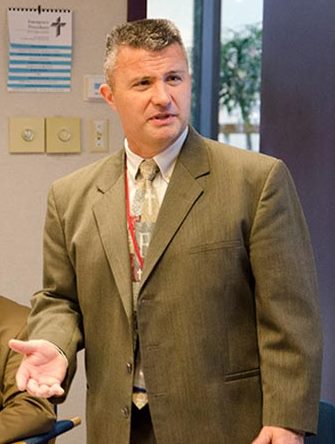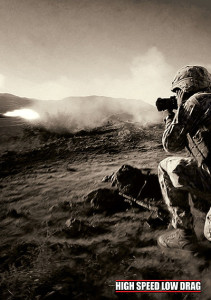 Mike Moreno is a Navy chaplain with eight years of active service and still serves in?the reserves. His mission is to equip churches and other non-profits’ with skills to welcome veterans and their families back home to their local
Mike Moreno is a Navy chaplain with eight years of active service and still serves in?the reserves. His mission is to equip churches and other non-profits’ with skills to welcome veterans and their families back home to their local
communities with a focus on medical care, jobs and education.
HSLD: Besides the little background that we’ve give about you, could you tell us a little more about yourself?
Mike: We have 1.8, 2 million people in service right now, but more are joining the draw and coming in, and my job is to help congregations and help folks realize you can make an impact to help your congregation or your community welcome back these warriors and their families.
The goal is to have them make a great transition where they are successful, the community is successful, and everyone grows and thrives. That’s what we’re about.
HSLD: Let?s start with your success quote. What is it?
Mike: Mine is “Ready, fire, aim.”
In the military and congregations that I’ve served, I always said “Hey, I really got to plan something out; I really have to get this done.” And so I’d get stuck in paralysis analysis and go “I’m not ready, I’m not ready.”
But I found if I went ready, fire, aim that something happened either good or bad but then I had to react to it and I was moving forward. Even if it was two steps back, one step forward, I was moving and moving is better than standing still.
HSLD: Let?s focus on your military experience. Tell us a story of your most pivotal moment in the US army and share with us some of the lessons you learned.
Mike: It would have to be when we were about to land in Kuwait in 2003 with the Marine Corps. I was the chaplain and we were in the LCUs, the landing crafts, getting out of the ships going onto shore. There were all kinds of Humvees and tanks and we were sitting in top of them.
And I’m sitting there on top of this Humvee, there’s this lance corporal and he starts looking back to the ship, back to what he knew was safe, and his gaze kind of stayed there for a minute. And there’s this chief warrant officer and he knocked him upside his head and he said, “Hey, listen. The way home is that way” and he pointed to the beach. And he said, “The way you’re going to get home is going forward. That’s our direction, that’s our mission. Don’t look back, look forward.”
 HSLD: Let?s focus on your transition out and the failures, challenges and lessons you got from it.
HSLD: Let?s focus on your transition out and the failures, challenges and lessons you got from it.
Mike: I had some family issues and I made the decision in 2006 to separate when my time was up. And I really hadn’t done that but it was a very clear-cut signal. I needed to come home to take care of some family matters.
So I did and at that point, I called up my church folks and said, hey, I’m coming back to Nebraska. They said, “Hey, that’s great. We can use you in a church over here. I said, no, listen I’m getting out the Navy and I’m coming to this specific town. It was like “Well, that’s great but there’s no churches there. There’s nothing to offer you.”
I said, listen. Because I think this is so important, I’m going to say “Welcome to Wal-Mart. I don’t care what it is. This is the direction I need to go to be home.”
Once I found out there were no church opportunities, I knew I come up with something to put food on the table. The Navy had sent me to do some video editing because they want to look at long-distance training and doing that with videos. So they sent me to this video course.
I know how to make videos so I thought, “This is cool. I’ll start a video company”. That was my plan about 6 months to 3 months out and that probably would have been a good thing.
But then I get a phone call with this position I’m in now saying hey, we want you from the church to work with churches. And so while I was ready to step out on my own, all of a sudden I got given, in a sense, a safety net. And that was really cool. I’m grateful for the opportunity, I’m grateful for the work I’ve had the opportunity to do but as I look back upon this, I kind of wonder what it would have been like if I had to swim faster, quicker. And again, I’m very grateful, I’m blessed by this. But as I look at it, sometimes the lesson is the deep water teaches you to swim faster.
I’m now at a point after NMX where saying hey, these are the opportunities, I can do this.. That question wasn’t fully answered when I got out and I didn’t have the opportunity to kind of sink or swim. Looking back upon it now, when you get out, it’s that ready, fire, aim. Get out and do it.
 HSLD: Can you share with us an AHA moment that you have had that has really spurred you on?
HSLD: Can you share with us an AHA moment that you have had that has really spurred you on?
I tell you,this comes from being a pastor. I love being a pastor, I’ve worked in different churches, et cetera and I really had kind of an insular kind of thinking like “hey, I’m a pastor. This is what I know how to do. I can preach, I can do sacraments, I can do church. I’ve got that.” And I wonder what it would have been like if I had done something else.
Once you kind of get to that one frame of thinking, it’s like “This is all I know how to do.
When I got in the military they said nobody, you’re going to learn how to do admin, nobody, you’re going to have to learn how to fight fires if you’re on board a ship.
And I realized that while I was a pastor, there were so many other things that I could learn and I already had the skill set for.
And my AHA moment was the fact the route that I’ve taken so far is not the only one. That was the biggest thing for me was to realize that where I’ve gone so far and what I’ve done so far is great. But the opportunities are out there and I can take advantage of those.
HSLD: What is one thing that has you most fired up today?
Warrior repair and maintenance. And what that is, it’s a podcast I’m working on for those folks who are struggling with issues after they get back.
Different people and veterans who have had struggles and have overcome those struggles share their story with those still in the middle of the fight and helping them, giving them hope and also giving them different resources so they can get to the other side as well.
 Lighting Round Answers
Lighting Round Answers
? What is the most difficult adjustment you had to make to the civilian world? It was a difficult adjustment just moving my family, coming to a new town but the civilian transition wasn’t difficult.
? What business advice would you pass along to someone making the transition now? Go. Do. And again what I mean by that is go out and do something.
? What is the biggest generalization of being a vet, if any, that you’ve had to overcome in the civilian world? Civilians don’t get it but they think talking to vets and working with vets is so hard. We’re people. They don’t know if they should call you Major or First Sergeant or if they’re supposed to salute — they just don’t know that world. And so they kind of get all caught up.
? What book would you recommend to our listeners? I got two. As you all know I’m a pastor so there’s one on the spiritual side and then one on the action side. Screwtape Letters by C. S. Lewis and Getting Things Done by David Allen.
? What?s the best way that we can find you? And one last parting piece of guidance. If there is something that’s not working for someone, find out what it is and find a solution for them and tell them face-to-face, tell them in an ebook, tell them in a podcast, do a video but solve people’s problems. Give them that solution. You do that you’re going to be successful. That’s church, that’s business — you name it, they can do that.
And to get ahold of me, they can contact me through my church website which is lcms.org.
